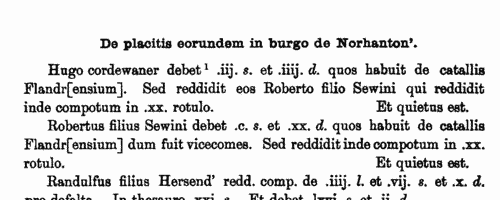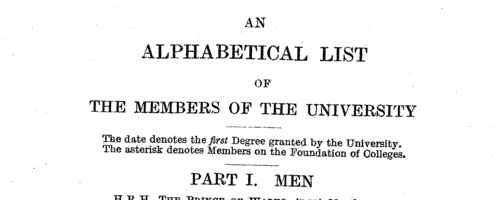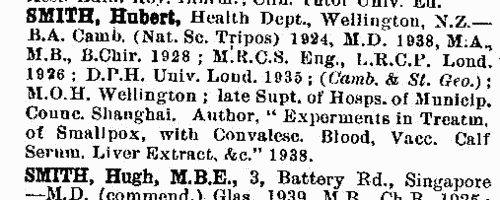Wicht Surname Ancestry ResultsOur indexes 1000-1999 include entries for the spelling 'wicht'. In the period you have requested, we have the following 11 records (displaying 1 to 10): Buy all | | | Get all 11 records to view, to save and print for £46.00 |
These sample scans are from the original record. You will get scans of the full pages or articles where the surname you searched for has been found. Your web browser may prevent the sample windows from opening; in this case please change your browser settings to allow pop-up windows from this site. Grantees of royal lands and pardons
(1175-1176)
The Great Rolls of the Pipe are the central record of the crown compiling returns of income and expenditure from the sheriffs and farmers of the various English counties or shires. This is the oldest series of public records, and the earliest surviving instances of many surnames are found in the Pipe Rolls. This is the roll for the 22nd year of the reign of king Henry II, that is, accounting for the year from Michaelmas 1175 to Michaelmas 1176. Most (but not all) of the entries in which names appear relate to payments for grants of land and fines or pardons. The large number of payments of fines for forest transgressions has been interpreted as a form of compounding for pardons by those who had rebelled during the recent years of unrest; or, looking at it in a different way, a form of extortion from the king in order to raise money to pay off the mercenaries with whose help he had quelled the rebellions. There is a separate return in each year for each shire, the name of the shire being here printed at the top of each page. Wales was still independent, in separate kingdoms, at this period, and is not included, except for 'Herefordshire in Wales'. WICHT. Cost: £4.00.  | Sample scan, click to enlarge

| Scottish litigants, rebels and cautioners
(1569-1578)
The Privy Council of Scotland exercised a superior judicial authority in the kingdom, and consequently received and dealt with a constant stream of petitions, as well as dealing with the internal security of the state. This register of the council from July 1569 to June 1578, in the reign of king James VI, was edited by John Hill Burton, Historiographer Royal for Scotland, and published under the direction of the Lord Clerk Register of Scotland in 1878. Some of the individuals mentioned are the complainants, those of whom they complained, and the sureties on both sides: at this period, some of the complainants are alleging serious attacks, often of a feuding nature. Many of the bonds entered into by the cautioners are promises to keep the peace towards such enemies. Failure to answer to the council when summoned was a serious contempt, leading to being denounced a rebel, with serious consequences. But 'horning' was also used in the pursuit of debts: there was no imprisonment for debt in Scotland, but a creditor could have an obstinate debtor ordered, in the sovereign's name, to pay what was due, failing which, the debtor could be put to the horn, denounced as a rebel, and imprisoned as a rebel.
WICHT. Cost: £4.00.  | Sample scan, click to enlarge

| Scottish litigants, rebels and cautioners: excluded names
(1569-1578)
The Privy Council of Scotland exercised a superior judicial authority in the kingdom, and consequently received and dealt with a constant stream of petitions, as well as dealing with the internal security of the state. This register of the council from July 1569 to June 1578, in the reign of king James VI, was edited by John Hill Burton, Historiographer Royal for Scotland, and published under the direction of the Lord Clerk Register of Scotland in 1878. Some of the individuals mentioned are the complainants, those of whom they complained, and the sureties on both sides: at this period, some of the complainants are alleging serious attacks, often of a feuding nature. Many of the bonds entered into by the cautioners are promises to keep the peace towards such enemies. Failure to answer to the council when summoned was a serious contempt, leading to being denounced a rebel, with serious consequences. But 'horning' was also used in the pursuit of debts: there was no imprisonment for debt in Scotland, but a creditor could have an obstinate debtor ordered, in the sovereign's name, to pay what was due, failing which, the debtor could be put to the horn, denounced as a rebel, and imprisoned as a rebel. In his preface to the first volume, Burton remarked that "There might perhaps be objections to the abundance of names of persons and places unknown to fame; but it was considered that in such a work the proper names of all persons and places occurring in the Register should be preserved, to be at the service of genealogical as well as historical investigators". But by this, second, volume, he decided that complete coverage was impractical, with "the crowding in of proper names, all but a few being the names of obscure persons ... Borderers are called up in considerable groups, and ordered to find, or recorded as having found, sureties for giving compensation to persons plundered, or for good conduct for the future. Several burgesses are sometimes entered in a minute about a Corporation quarrel. When the particulars of unimportant private litigations are omitted, the names remain." He therefore devised this 'Index of Names excluded from the Text', giving name, conditions, and date in register.
WICHT. Cost: £4.00.  | Sample scan, click to enlarge

| Scottish litigants, rebels and cautioners
(1610-1613)
The Privy Council of Scotland exercised a superior judicial authority in the kingdom, and consequently received and dealt with a constant stream of petitions, as well as dealing with the internal security of the state. This register of the council from July 1610 to February 1613, in the reign of king James VI, was edited by David Masson and published under the direction of the Deputy Clerk Register of Scotland in 1889. The publication starts with the Acta and Decreta, a chronological consolidation of material from Acta Secreti Concilii proper, the Decreta, the Book of Commissions, the Book of Sederunts, the Minute Book of Processes, and The Book of the Isles. There is then a section of Royal and Other Letters (pp. 565-644); then acts and bands (bonds) of caution (surety) from the registers called Acta Cautionis (pp. 647-690); and Miscellaneous Privy Council Papers (693-746). Many of the individuals mentioned are the complainants, those of whom they complained, and the sureties on both sides: at this period, many of the complainants are alleging serious attacks, often of a feuding nature. Many of the bonds entered into by the cautioners are promises to keep the peace towards such enemies. Failure to answer to the council when summoned was a serious contempt, leading to being denounced a rebel, with serious consequences.
WICHT. Cost: £4.00.  | Sample scan, click to enlarge

| Cape Town Directory
(1822)
The 1822 African Court Calendar and Directory, published under the sanction of government, includes this directory of Cape Town. The inhabitants are listed alphabetically by surname and christian name, with occupation and address.WICHT. Cost: £4.00.  | Sample scan, click to enlarge

| Inhabitants of Cape Town (1822)
This directory of the residents of Cape Town was compiled by A. Richert senior, superintendent of the Printing Office, for the African Court Calendar published under the sanction of the government of the Cape of Good Hope.
WICHT. Cost: £8.00.  | Sample scan, click to enlarge

| Medical practitioners qualified in Britain or Ireland but living abroad
(1926)
The Medical Directory was split into several sections. The Practitioners Resident Abroad section covered all medical practitioners who, having qualified in Britain or Ireland or otherwise registered under the medical Acts of Great Britain and Ireland, were living abroad. Each year a schedule was sent to each doctor to be returned to the publishers, so as to keep the directory up to date. In the directory the doctor's name is given first, in bold, surname first, in capitals; then current address. Next are the qualifications; the italic abbreviations in parentheses following the qualifications indicate the medical school at which they were gained. Then there is a list of posts and honours within the profession, starting with those then current; previous posts are preceded by the word 'late'. Finally, brief details are given of any publications. WICHT. Cost: £4.00.  | Sample scan, click to enlarge

| Members of Oxford University: Men
(1931)
The Oxford University Calendar for 1931 includes this list of all living members of the university, i. e. not only undergraduates and members of staff, but also all surviving graduates from earlier generations. The names are arranged alphabetically by surname, then by college in order of foundation. Surnames are given, initials, highest degree, name of college, and then the year of graduating the first degree. For undergraduates only name and college is given. An asterisk before a surname indicates a member on the foundation of the college. There are separate lists for men and women.WICHT. Cost: £4.00.  | Sample scan, click to enlarge

| Doctors trained in Britain or Ireland but living abroad
(1948)
The Medical Directory was split into several sections. The Practitioners Resident Abroad section covered all medical practitioners who, having qualified in Britain or Ireland, were living abroad. Each year a schedule was sent to each doctor to be returned to the publishers, so as to keep the directory up to date. In the directory the doctor's name is given first, in bold, surname first, in capitals; then current address. Next are the qualifications; the italic abbreviations in parentheses following the qualifications indicate the medical school at which they were gained. Then there is a list of posts and honours within the profession, starting with those then current; previous posts are preceded by the word 'late'. Finally, brief details are given of any publications. Inclusion of names in the list did not imply a right to practise in the country of residence.WICHT. Cost: £2.00.  | Sample scan, click to enlarge

| Naval Officers
(1957)
The Navy List for 1957, corrected to 18 January 1957, includes this main catalogue of 'Officers on the Active List of the Royal Navy and the Royal Marines and Retired and Emergency Officers Serving'. The first column gives surname and initials. The second column is rank, with a profusion of abbreviations, most of which are self-evident, often qualified by a specialisation, in brackets. The third column is for specialisations not demonstrated in rank. Fourth column is date of seniority (those given in italics are of ranks held previous to 1 January 1957 by Special Duties Officers); and fifth column, where serving. WICHT. Cost: £4.00.  | Sample scan, click to enlarge

|
| 1 | 2 |  |
Research your ancestry, family history, genealogy and one-name study by direct access to original records and archives indexed by surname.
|












